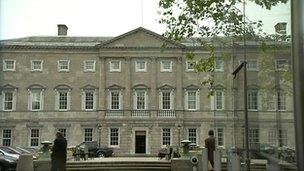Irish government publishes plans to abolish Seanad
- Published

Leinster House in Dublin is the seat of the Irish parliament
The Irish government has published its proposed amendment to the constitution to abolish the Seanad (senate).
Taoiseach (prime minister) Enda Kenny said the government's proposed reforms would lead to a more efficient system with greater oversight.
He said Ireland had too many politicians for its size and the government had to question the need for a second chamber.
Sixty senators sit in the Seanad, based in Dublin's Leinster House.
The senators are not elected by the public. The senate can delay laws with which it disagrees, but cannot veto them outright.
The 32nd Amendment of the Constitution (Abolition of Seanad Ćireann) Bill 2013 provides for 40 amendments to the Irish constitution to remove references to the upper house.
If passed by the people in a referendum, the Seanad would cease to exist from the time of the next general election.
The bill says that no new Seanad election will be held when the current DƔil (Irish parliament) is dissolved.
The Seanad would be abolished from midnight of the day before the new DƔil meets.
Mr Kenny said other systems, such as New Zealand, had shown it was possible to introduce checks and balances in a single-chamber parliament.
He said the abolition of the Seanad, along with the reduction by eight in the number of TDs (members of parliament), would mean a reduction of almost one third in the number of public representatives.
He said 20m euros (Ā£17m) per year would be saved.
Mr Kenny said measures were to be introduced to improve the working of the DƔil to ensure proper accountability and oversight.
'Constitutional vandalism'
However, the Democracy Matters group has described the plans as "constitutional vandalism".
Senator Feargal Quinn said: "This government was elected on a promise of real and radical political reform, instead what we are seeing today is yet more of the same, deeply cynical and short-sighted proposals dressed up as reform.
"These proposals are anything but reforming, they will damage our democracy, vandalise our constitution, and concentrate more power in the hands of cabinet members."
Ireland's biggest opposition party, Fianna Fail, said it would campaign against the abolition of the Seanad.
It favours reform of the upper chamber and said abolishing the Seanad would lead to "less accountability and less transparency".
Irish President Michael D Higgins said it was a matter for the people to decide the future of the Seanad.
- Published21 July 2011